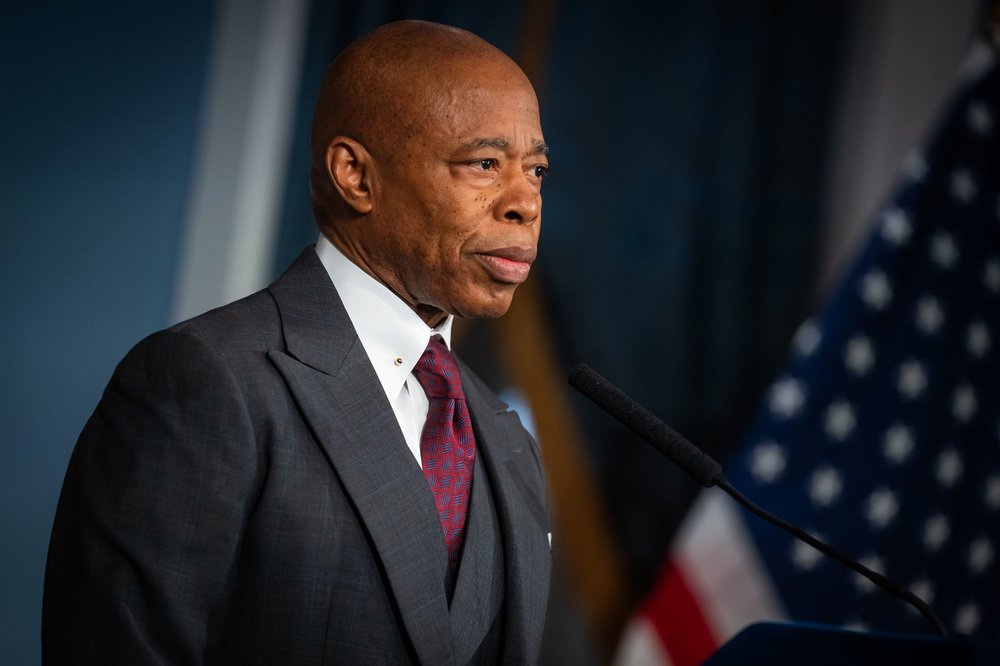With a path out of indictment, Mayor Adams faces a reelection focused on Trump
Feb. 11, 2025, 4:28 p.m.
The Trump DOJ's order to dismiss the mayor’s case is intensifying arguments that Adams is too compromised to govern.

The race to unseat Eric Adams is becoming a contest between an incumbent mayor seen as increasingly aligned with President Donald Trump and a slate of Democrats campaigning to defend New York City’s interests against the White House.
That message reached a crescendo late Monday when the Department of Justice ordered federal prosecutors to drop the corruption charges against Adams, a move Trump hinted at during his campaign.
But while the mayor’s legal troubles could soon be behind him, he already faces daunting obstacles to his reelection, including low approval ratings, a slowdown in fundraising hampered by the city’s denial of matching funds and a crowded primary field of challengers eager to pounce on his bond with Trump.
Despite making inroads during the last election, Trump won roughly only 30% of the city’s vote and remains widely unpopular among Democrats. In late 2023, shortly after news broke of the federal investigation into Adams’ campaign but long before his indictment, Adams received the lowest approval rating of any New York City mayor since the mid-1990s.
Adams maintains the advantage of incumbency, and in a city where ranked-choice voting gives many candidates opportunities to collect support, his name recognition remains far ahead that of his competitors.
But the mayor’s ties to Trump threaten to erode his support. The city’s Black voters, who form a critical part of the mayor's base, overwhelmingly cast their ballots for Kamala Harris in November.
The Rev. Al Sharpton, a famed civil rights activist and longtime friend of Adams, called the Department of Justice's move “alarming at best.” Speaking on his daily radio show, Sharpton said the fact that the memo instructed the charges to be dropped “without prejudice” – allowing them to be refiled at any time – makes Adams “a hostage of Donald Trump’s administration.”
“This is how he deals with Blacks in power,” Sharpton said of Trump.
Sharpton was a staunch defender of Adams after the mayor’s indictment in September. But on Tuesday, he implied he may be reconsidering, saying he planned to convene with a group of elected officials and clergy in the coming days “to decide where we will go.”
“Because we have clearly crossed the Rubicon,” he said.
Basil Smikle, a former Democratic consultant who teaches at Columbia University, said he was surprised by the degree of the president’s influence on Adams.
“If I'm one of his opponents, I would say, ‘He sold out the city for his own personal freedom,’” Smikle said.
Several of Adams’ mayoral challengers said just that on Tuesday.
“Today Eric Adams no longer works for New Yorkers,” said state Sen. Zellnor Myrie of Brooklyn at a press conference in front of City Hall. “He works for Donald Trump. Period.”
City Comptroller Brad Lander said that “when the president harms or threatens New York City, the mayor will be unable to fight back because he clearly cares about staying out of prison more than he cares about the well-being of New Yorkers.”
Scrutiny of the mayor’s motivations has been building for months as Adams has openly sought Trump’s favor. In January, the mayor flew to Florida to have lunch with the president at his golf course. Days later, he made a last-minute trip to Washington D.C. to attend the inauguration.
The mayor has said he would not publicly criticize Trump, and ordered agency leaders to do the same at a meeting with top officials on Monday.
Afterward, Public Advocate Jumaane Williams wrote an open letter to the city’s workforce, saying “Trump is not the mayor of New York City. … City workers do not take orders from him – well, except perhaps one specific city employee, up in Gracie Mansion.”
Adams’ growing embrace of Trump has fueled speculation that the Democratic mayor, who was a registered Republican for a period in the 1990s, would return to the GOP. Though Adams initially declined to rule out the possibility, he later said he planned to run as a Democrat.
As of Tuesday, Adams had not filed an updated voter registration to switch parties, an official at the New York City Board of Elections confirmed. The deadline to change parties ahead of the primary is Friday.
Billionaire Republican political donor John Catsimatidis was dining with Adams at Gallagher's Steakhouse in Midtown on Monday when they both learned about the Justice Department’s decision.
“He looked like 1,000 pounds of bricks were off his shoulder,” Catsimatidis said. The supermarket mogul, who also ran for mayor in 2013, is a staunch Trump supporter and owns conservative talk radio station WABC, where he hosts a weekly show.
“If I was him I’d want to keep all my options open,” Catsimatidis said, referring to the possibility of switching parties.
Some Democratic observers are not ready to count Adams – or any of his competitors – out of the race yet.
Rebecca Katz, a Democratic political consultant who was one of the architects of Bill de Blasio’s successful 2013 mayoral campaign, said there’s still too much uncertainty to predict the race, even for candidates polling in single digits.
“Bill de Blasio could not get a break for months and months and months of the 2013 race,” she said.
It took until the month before the primary for de Blasio to emerge as a front-runner in the race, said Katz, who is not currently working for any of the mayoral candidates.
Mayor Adams says corruption case is over, but Justice memo holds no guarantees DOJ directs prosecutors to drop Mayor Adams’ corruption case